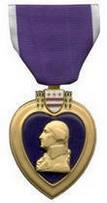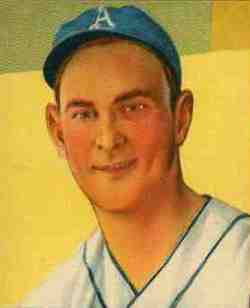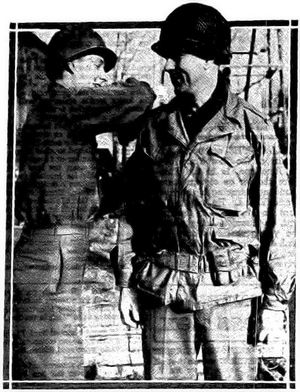Click here for details
 Jack Knott
Jack Knott
Date and
Place of Birth:
March 2, 1907 Dallas, Texas
Died:
October 13, 1981 Brownwood, Texas
Baseball
Experience:
Major League
Position:
Pitcher
Rank:
First Lieutenant
Military Unit:
Headquarters Company,
104th Infantry Division
US Army
Area
Served:
European Theater of Operations

John
“Jack” Knott was born on March 2, 1907 in
Dallas, Texas. He attended Southern Methodist
University and signed with
Corsicana
of the Texas League in 1926. He was 13-8 with
Palestine
of the Lone Star League in 1928 and hurled for Mission of the Pacific Coast League the
following two years.
Knott joined Milwaukee of the American Association in 1931.
He was 11-9 that year and 17-12 in 1932, prompting his sale to the
St Louis Browns. The 26-year-old right-hander made his debut with
the Browns on April 13, 1933. He was 1-8 for the last-placed team
but was 10-3 in 1934 as the Browns climbed to sixth place.
Knott was traded to
the White Sox in June 1938 and joined the Philadelphia Athletics in
1941. He was 2-10 for the basement-dwelling Athletics in 1942 before
entering military service on November 24 of that year.
Knott served with the
Army at Camp Wolters
Reception
Center
in Texas, before being assigned to Camp Adair, Oregon
as an acting first sergeant with the 104th “Timberwolf”
Infantry Division. During the summer of 1943, Knott had plenty of
opportunity to play baseball with the 104th Timberwolves
team. Home games were played at George Waters Field, formerly home
of Salem in Western International
League, and much of the equipment they used was made available by
Mrs George Waters, owner of the Salem club. The Timberwolves won the Oregon state semipro and Pacific
Northwest servicemen's titles that year.
In April 1944, Knott
was first sergeant with Headquarters Company of the 104th
Division at Camp Carson,
Colorado. The division
was shipped to Europe later in the year and landed in
France
on September 7,
1944. The 104th's first combat
experience occurred during the latter part of the
Battle of the Scheldt – an
operation in northern Belgium
aimed at opening the
port
of Antwerp to
Allied shipping. On November 6, 1944, the 104th began moving by
motor convoy towards Aachen,
Germany
and participated in the Battle of Hurtgen Forest.
 |
| Jack Knott shortly after receiving his
battlefield promotion to second lieutenant |
On January 8, 1945, he received a battlefield commission, when he
was promoted to second lieutenant. Two days later he was wounded and
was awarded the Purple Heart.
As the German offensive in the Ardennes wound down, the division
moved across the Roer River.
On March 5, it entered Cologne after
heavy fighting, and crossed the Rhine
at Honnef on March 22, 1945. Knott earned a further promotion during
this time, being made a first lieutenant.
After liberating the Mittelbau Dora concentration camp near
Nordhausen on April 11, the division met up with the Russian Army at
Pretzsch on April 26, where they
remained until the German surrender on May 7.
The 104th Infantry Division left Europe for the
United States
on June 27, 1945, and by July he was at home on leave with his wife
in Brownwood, Texas.
On August 3, 1945, Knott was at
San Luis Obispo, California,
where he talked of hoping to get a coaching job or minor league
manager’s job after service. He was discharged from the Army at Fort Ord, California
on November 19, 1945.
Jack Knott was 39 years old when he returned to the Athletics in the
spring of 1946. He made three appearances for the team before being
released on May 18. He briefly played for Jersey City of the
International League before retiring from the game.
In December 1946, Knott became the Southwest scout for the
Cincinnati Reds. He was hired by Richard W Burnett, owner of the
Dallas Rebels, in July 1948, as a personal contact man and scout. He
later worked as a baseball school instructor and minor league
business manager.
Jack Knott passed away on
October 13, 1981 in
Brownwood, Texas. He was 74 years old and is buried at Greenleaf Cemetery
in Brownwood.
Created February 15, 2008.
Copyright © 2008 Gary Bedingfield (Baseball
in Wartime). All Rights Reserved.


 Jack Knott
Jack Knott
